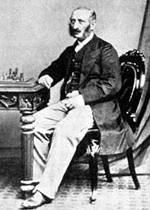Loewenthal Johann Jacob (15.07.1810 – 20.07.1876)
 A Hungarian of Grandmaster strength who came to live in England (1851) and played a major role in English chess.
A Hungarian of Grandmaster strength who came to live in England (1851) and played a major role in English chess.
During the 1850s, he was in the world top seven or eight and was probably the best opening theorist of his day. He was born in Budapest, into a family of a Budapest merchant, studied chess under Szen and first became widely known as a member of the correspondence team that defeated Paris, 1842-45. In 1846 he traveled in Europe, defeating many players, but lost more games than he won when he played Lasa in Vienna. He served Kossuth’s revolutionary government in a civilian capacity, and when the regime was overthrown in 1849, he had to flee Hungary and arrived in New York almost penniless, with the intention of traveling west and settling there. Educated, cultured and elegantly dressed, he could hardly have thought of a less suitable plan.
Fortunately, chess players, especially Stanley, came to his aid, and he began a professional chess career by establishing a cigar divan in Cincinnati. While visiting New Orleans in 1850, Lowenthal lost +0=1-1 to the 13-year-old Morphy. About a year later, his customers paid his fare to the London International Tournament of 1851. Being in poor health, he was eliminated by Williams in the first round. Although he subsequently gained his revenge in a match (+7=4-5), he felt too embarrassed to return to the USA, where so much had been expected of him. He sought to remain in London, and Staunton, who sympathized with his plight as a political refugee, obtained for him the secretaryship of the St. George’s Chess Club at £100 a year. Lowenthal settled in England and became naturalized in 1866, taking the given name John.
He is usually known, however, by the German form, Johann. He worked hard teaching chess (he invented the demonstration Board), organizing chess events (including the world’s Second International Tournament, London 1862), and editing chess columns, the best known being in The Era from 1854 to 1867. He edited the Chess Player’s Magazine from 1863 to 1867, and for many years, first as manager and then as secretary, served the British Chess Association. He was also active in the Masonic movement.
Lowenthal’s somewhat nervous temperament was not well suited to serious play. In 1851 he lost a short match to Buckle, and he had the worse of a series of games with Anderssen. In 1853 he narrowly lost a long match against Harrwitz; in 1858 he lost to Morphy, although he gained a substantial opening advantage in most of the games. Lowenthal’s best performance was at the Birmingham Tournament in 1858. He won first prize (£63) after scoring victories over Staunton (+2), Owen (+2=1), and Falkbeer (+3=4-1) in successive rounds.
The greatest openings expert of his time, he often failed to make the most of the advantages he gained. Staunton remarked: ‘The Hungarian plays the openings remarkably well – but when he gets into the middle game he plays like a took player’, adding after a pause, ‘By George, sirs, he is a rook player’. After 1860 he devoted less time to play and more to chess administration and journalism; he was a manager of the BCA. With Medley, he organized the London Tournament in 1862. Courteous, honest, with ‘a sense of propriety’, Lowenthal was well liked. He ‘tried to please everybody’ and attempted the almost impossible feat of maintaining a friendship with both Staunton over the trifling matter of who won most of the friendly games when they played together in the winter of 1851-52. When Lowenthal fell ill in 1874, a fund of £100, subscribed by Lord Randolph Churchill, Wyvill, Cochrane, and many other chess friends, provided for his retirement at St Leonards-on-Sea where he died and was buried. He left all he had ‘to promote the interests of English chess’.
The Lowenthal Cup, of solid silver, was purchased by his executors. First awarded in the individual competition, the cup has been the annual trophy of the champion county in England since 1922. The author of The Chess Congress of 1862 (1863), a substantial work of 630 pages, which also covers events from 1840 to the onset of the Congress. He also wrote Morphy’s Games of Chess (1860), the only collection that was made with Morphy’s assistance. (Source: The Oxford Companion to Chess).



